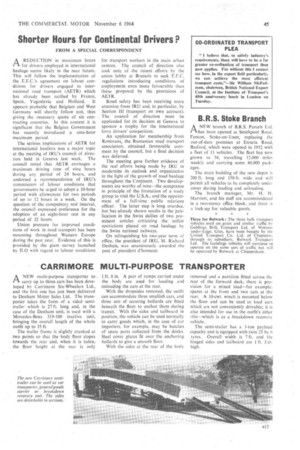Shorter Hours for Continental Drivers P
Page 47

If you've noticed an error in this article please click here to report it so we can fix it.
FROM A SPECIAL CORRESPONDENT
AREDUCTION in maximum hours for drivers employed in international haulage seems likely in the near future. This will follow the implementation of the E.E.C.'s agreement on labour conditions for drivers engaged in international road transport (AETR) which has already been ratified by France, Spain, Yugoslavia and Holland. It appears probable that Belgium and West Germany will shortly follow suit, thus giving the necessary quota of six contracting countries: In this context it is significant that the Belgian Government has recently introduced a nine-hour maximum period.
The serious implications of AETR for international hauliers was a major topic at the meeting of 1RU's council of direction held in Geneva last week. The council noted that AETR envisages a maximum driving time of nine hours during any period of 24 hours, and endorsed a recommendation of IRU's commission of labour conditions that governments be urged to adopt a 10-hour period with allowances for two periods of up to 12 hours in a week. On the question of the compulsory rest interval, the council expressed preference for the adoption of an eight-hour rest in any period of 32 hours.
Union pressure for improved conditions of work in road transport has been mounting throughout Western Europe during the past year, Evidence of this is provided by the giant survey launched by ILO with regard to labour conditions for transport workers in the main urban centres. The council of direction also took note of the recent efforts by the union lobby at Brussels to seek E.E.C. regulations introducing conditions of employment even more favourable than those proposed by the provisions of AETR.
Road safety has been receiving more attention from IRU and, in particular, by Section III (transport on own account). The council of direction must be applauded for its decision at Geneva to sponsor a trophy for the international lorry drivers' competition.
An application for membership from Romtrans, the Rumanian road transport association, obtained favourable comment by the council, but a final decision was deferred.
The meeting gave further evidence of the real efforts being made by IRU to modernize its outlook and organization in the light of the growth of road haulage throughout the Continent. Two developments are worthy of note—the acceptance in principle ofthe formation of a study group to visit the U.S.A., and the appointment of a full-time public relations officer. The latter step is long overdue, but has already shown results in the publication in the Swiss dailies of two prominent articles criticizing the unfair restrictions placed on road haulage by the Swiss national railways.
On relinquishing his two-year term of office, the president of IRU, M. Richard Deshais, was unanimously awarded the post of president d'honneur.












































































































































































